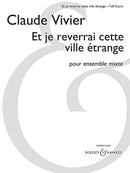| 作曲者 | Claude Vivier (1948-1983) |
| タイトル | Et je reverrai cette ville etrange |
| 出版社 | Boosey & Hawkes・ブージー&ホークス |
| 楽器編成 | chamber ensemble |
| 楽器編成(詳細) | trumpet, piano, viola, cello, double bass and Percussion (celesta, vibraphone, trompong, chang, Balinese gong, tam-tam with super ball) |
| 品番 | 9790051097890 |
| 難易度 | 上級 |
| 形状 | 24 ページ・Saddle stitching |
| 演奏時間 | 15分 |
| 作曲年 | 1981年 |
| 出版年 | 2017年 |
| 出版番号 | BHI 9789 |
| ISMN | 979-0051097890 |
| ISBN | 9781495061028 |
Editor’s Note:Et je reverrai cette ville étrange (1981), commissioned by the Toronto ensemble ARRAYMUSIC, is without doubt among the most striking works of Claude Vivier. It is an entirely monadic composition in which the melody is played, unaccompanied, by all instruments in unison. Here, as is typical of the music of Vivier, the importance of the melodies is carried to its extreme. As the composer himself stated, “I may have reached the purest form of melody in Et je reverrai cette ville étrange.”The work, a suite of five persistent modal melodies, is remarkably accessible. The standard use of melody (quasi improvisando) and frequent ornamentation bear witness to the integration of Eastern melodic principle. The use of percussion instruments such as the Japanese rin (a metal instrument of Buddhistic origins), and the Balinese gong and tromping (a series of small horizontal gongs) emerges from the same inspirational source. The ritualistic nature of the work is reinforced by the repetition of entire motifs and melodic lines. All of these elements as well as the title of the work make of Et je reverrai cette ville étrange a natural continuation of the ‘Eastern’ works of the previous period (Shiraz, Bouchara, Samarkand ...). It is therefore surprising that these five melodies were borrowed verbatim from Learning, a piece for four violins and percussion composed in 1976, thus prior to the composer’s trip to Asia. For Vivier, the Orient remains an undefinable zone, attainable only through the winding pathways of the imagination. Et je reverrai cette ville étrange appears above all to be a reference to mystery and to nostalgia.- Jaco Mijnheer -



